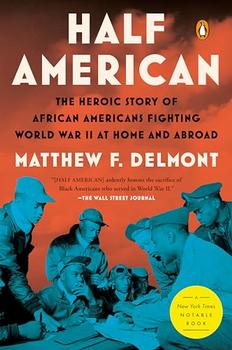Summary | Excerpt | Reviews | Beyond the Book | Read-Alikes | Genres & Themes | Author Bio

The Epic Story of African Americans Fighting World War II at Home and Abroad
by Matthew DelmontThis article relates to Half American
Before he was hanged for his alleged role in the Camp Logan Mutiny, Army Pfc. Thomas Hawkins wrote a letter to his mother and father. It was both poignant and simple. "When this letter reaches you, I will be beyond the veil of sorrow. I will be in heaven with the angels…I am not guilty of the crime that I am accused of but Mother it is God's will that I go now." The crime Hawkins had been accused of playing a part in was the murder of 16 whites during a riot in segregated Houston, Texas in 1917. At least four black soldiers were also killed.
In Half American: The Epic Story of African Americans Fighting World War II at Home and Abroad, Matthew Delmont draws attention to the hostile and racist atmospheres that black American soldiers were historically subject to on segregated military bases long before WWII , with one example being Camp Logan in Houston. Hawkins was a member of the Third Battalion 24th Infantry, an all-black regiment. The United States Department of War sent the battalion to Texas to guard Camp Logan, which was under construction and when completed was to be a training site for the Illinois National Guard. The 24th Infantry took the train from Columbus, New Mexico, accompanied by several white officers.
Although many of the Third Battalion soldiers were accustomed to Jim Crow, they expected equal treatment as military servicemen, not dehumanization and racial tension. But the Houston Police Department (HPD) saw the servicemen as a threat. If the black soldiers were treated like white soldiers, then black Houstonians would expect similar equality.
No one expected Armageddon on August 23, 1917. It started when a black woman who lived in the Fourth Ward, a historically black neighborhood, was arrested after HPD officers wrongfully entered her house while chasing a suspect. Refusing to believe she wasn't involved with the suspect's crime, they dragged her out of her house and arrested her. Upon seeing her arrest, Private Alonzo Edwards attempted to intervene, but was pistol whipped and then arrested himself. Corporal Charles Baltimore went to inquire about Edwards, and he was beaten and then shot at by police as he fled.
A rumor circulated that Baltimore had been murdered. A second rumor that a white mob was coming towards the base created chaos. Some soldiers grabbed weaponry and marched downtown, searching for police officers, four of whom were killed, along with several civilians. After inadvertently killing a member of the Illinois National Guard whom they had mistaken for HPD, the soldiers retreated to Camp Logan.
The Army prosecuted 118 soldiers. Seven agreed to testify against the others and were given clemency. Between November 1, 1917, and March 26, 1918, three court martial trials were held — in a San Antonio chapel because the courtroom wasn't large enough.
Of the 118 soldiers tried, 110 were found guilty. Nineteen were hanged and 63 received life sentences. No white civilians ever faced charges. President Woodrow Wilson commuted the sentences of 10 soldiers from death to life in prison on the recommendation of his Secretary of War.
Thomas Hawkins' letter to his parents was a testimony of innocence. His nephew Jason Holt said, "To many, the Houston Riots is simply a footnote in history. But for us, the family members, it's a little different. For us, it's a time when we know that we lost someone dear to our family."
Angela Holder, a history professor at Houston Community College and great-niece of Corporal Jesse Moore, one of the hung soldiers, explains, "They were denied due process guaranteed by the Constitution and died horrible deaths. They were represented by one lawyer and didn't even have a chance to appeal." Charles Anderson, a relative of another one of the hanged soldiers, points out that during the trial, "not one civilian could identify a soldier firing shots that killed people."
"The men did not have a fair trial," says Sandra Hajtman, great-granddaughter of one of the policemen killed, whose career as a legal secretary spurred her interest in the court martial proceedings. "I have no doubt about the likelihood the men executed had nothing to do with the deaths."
Scene during court martial of 64 members of the 24th Infantry United States of America on trial for mutiny and murder at Houston, Texas on August 23, 1917.
Source: U.S. National Archives and Records Administration via Wikimedia Commons
Filed under People, Eras & Events
![]() This "beyond the book article" relates to Half American. It originally ran in November 2022 and has been updated for the
January 2024 paperback edition.
Go to magazine.
This "beyond the book article" relates to Half American. It originally ran in November 2022 and has been updated for the
January 2024 paperback edition.
Go to magazine.
Your guide toexceptional books
BookBrowse seeks out and recommends the best in contemporary fiction and nonfiction—books that not only engage and entertain but also deepen our understanding of ourselves and the world around us.